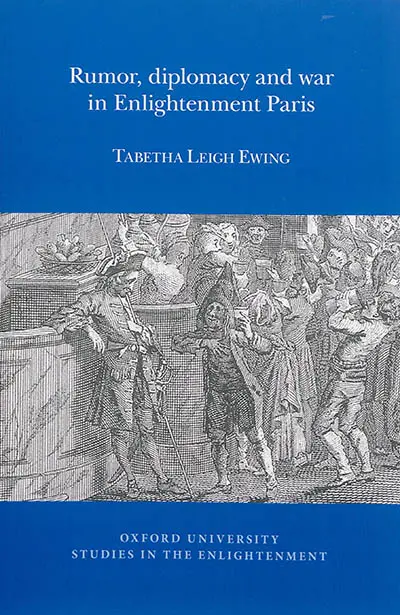en savoir plus

Permet à tous ses détenteurs d'obtenir 5% de réduction sur tous les livres lors du retrait en magasin (réduction non cumulable avec les réductions de type étudiant).
Offre également un certain nombre d'avantages auprès de nos partenaires.
Avec les favoris, retrouvez dans un espace les sélections effectuées au fur et à mesure de vos navigations dans le site.
Constituez pour votre usage personnel vos listes de livres en prévisions d'achats futurs et votre sélection d'articles, dossiers, événements, vidéos ou podcasts préférés ou à découvrir plus tard...
Il suffit simplement de cliquer sur "Ajout Favori" sur chaque page qui vous intéresse pour les retrouver ensuite dans votre espace personnel.
Requiert un compte Mollat
Requiert un compte Mollat
Rumor, diplomacy and war in Enlightenment Paris
Auteur : Tabetha Leigh Ewing
en savoir plus
Résumé
Cet ouvrage analyse les différentes formes de conversation écrites ou orales, qui se sont tenues lors de la guerre de succession d'Autriche (1740-1748), dans différents milieux sociaux, de sources officielles ou officieuses, au sujet de la guerre et des relations diplomatiques. Il montre comment ces formes ont conduit à de nouvelles compréhensions de l'identité politique. ©Electre 2026
Quatrième de couverture
Paris 1744 : a royal official approaches a shopkeeper's wife, proposing that she become an informant to the Crown and report on the conversations of foreign diplomats who take meals at her house. Her reports, housed today in the Bastille archives, are little more than a collection of wartime rumors gathered from clandestine, handwritten newspapers and everyday talk around the city, yet she comes to imagine herself a political agent on behalf of Louis XV. In this book Tabetha Ewing analyses different forms of everyday talk over the course of the War of Austrian Succession (1740-1748) to explore how they led to new understandings of political identity.
Royal policing and clandestine media shaped what Parisians knew and how they conceptualized events in a period of war. Responding to subversive political verses or to an official declaration hawked on the city streets, they experienced the pleasures and dangers of talking politics and exchanging opinions on matters of state, whether in the café or the wigmaker's shop. Ewing argues that this ephemeral expression of opinions on war and diplomacy, and its surveillance, transcription, and circulation shaped a distinctly early-modern form of political participation. Whilst the study of sedition has received much scholarly attention, Ewing explores the unexpectedly dynamic effect of loyalty to the French monarchy, spoken in the distinct voices of the common people and urban elites. One such effect was a sense of national identity, arising from the interplay of events, both everyday and extraordinary, and their representation in different media. Rumor, diplomacy and war in Enlightenment Paris rethinks the relationship of the oral and the written, the official and the unofficial, by revealing how gossip, fantasy, and uncertainty are deeply embedded in the emergent modern, public life of French society.
Fiche Technique
Paru le : 30/07/2014
Thématique : Histoire moderne générale
Auteur(s) : Auteur : Tabetha Leigh Ewing
Éditeur(s) :
Voltaire Foundation
Collection(s) : Oxford university studies in the Enlightenment
Série(s) : Non précisé.
ISBN : 978-0-7294-1142-4
EAN13 : 9780729411424
Reliure : Broché
Pages : X-311
Hauteur: 24.0 cm / Largeur 16.0 cm
Poids: 0 g

